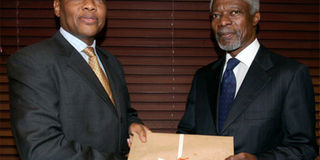Breaking News: At least 10 feared to have drowned in Makueni river
Annan has done his bit; why won’t he allow Kenyans to shape own destiny?

Former UN Secretary General Kofi Annan (R) receives a sealed envelope with a report on Kenya's post election violence in 2007 from Justice Philip Nyamu Waki, head of the Commission of Inquiry into the Post Election Violence, at his hotel in Nairobi October 17, 2008. Photo/FILE
What you need to know:
- While it’s clear that the court is biased in its interventions, the response of its key defenders is characteristically impervious, obdurate and patronising.
Many nations throughout the world have joined Africa’s outraged voices against the manner in which the International Criminal Court intervenes in regional and national crises.
While it’s clear that the court is biased in its interventions, the response of its key defenders is characteristically impervious, obdurate and patronising.
As in the past, the philosophy of the court’s proponents focuses on delegitimising, then completely ignoring African concerns. Even more disturbing is the infinite flexibility of terms like ‘sovereignty’, ‘interference in internal affairs’ and ‘democracy’ acquire in discourse involving Africa.
The upshot of it all is that African sovereignty is qualified, and that as long as you belong in the West, there is vast latitude to intervene robustly in Africa’s internal affairs. It is the one constant of Western consensus.
One key champion of this agenda is Mr Kofi Annan. As regards the Kenyan cases, the former UN boss is desperately keen to maintain the fallacious impression that they are about justice for the victims.
He is the man who ‘mediated’ upon the very emphatic direction of the US State Department and UK Foreign Office, the principal sponsors of his international career.
This anomalous mediation chiefly entailed Mr Annan repeating the vehement asides of American and British officials. Ultimately, he referred the Kenyan cases to the ICC as a brazen gambit in perpetrating a partisan political agenda aimed at securing his patrons’ interests.
The referral itself was a blatant contravention of Kenyan law, and a total usurpation of the President’s mandate. The Waki Commission, the original travesty, which generated the material for the indictments, was to conclude by handing to the President its findings and recommendations as per the Commission of Inquiry Act.
Waki handed part of the report to President Kibaki, and the names to Mr Annan, who used the “sealed envelope” to tinker with local political alignment and blackmail Kenya’s political leadership. Ultimately, after his many threats failed, he sent the “envelope” to Luis Moreno-Ocampo. The rest is history.
As a former secretary-general of the UN, Mr Annan must have quite some clout in the UN circles. As the plenipotentiary of Western powers throughout Africa and the Middle East, this clout transmutes into a formidable array of technocratic and political power.
In respect to the prosecution of the Kenyan cases, he is the conductor of an international orchestra.
When Mr Annan spoke recently during the Archbishop Tutu Lecture at the University of the Eastern Cape, he made it clear that he had not finished with Kenya, and that he was the de facto dictator of Kenyan destiny.
To underscore his dissatisfaction, and therefore, his patrons’ disenchantment with Kenyans’ democratic preference of President Kenyatta and Deputy President William Ruto, Mr Annan literally renounced democracy as a governing principle.
Although he made desultory noises about “deepening democracy”, he subsequently urged Africa to “turn our backs on the ‘winner-take-all’ approach to politics which has been so damaging to our continent”.
More critically, the eventual outcome of Mr Annan’s mediation in Kenya was antithetical to democratic sovereignty. It annulled the election of Mr Mwai Kibaki and created an undemocratic “Grand Coalition Government”, a quixotic political project that visited excruciating grief on Kenyans and led to spectacular dysfunction and corruption.
Mr Annan then opened another franchise for this doomed experiment in Zimbabwe with predictable results. He now wishes to elevate it to a pan-African governance philosophy.
The sheer effrontery of it all is unbelievable. That he actually deems this a substitute for democracy is the most hypocritical nonsense an international civil servant has managed, ever.
But the hypocrisy does not stop there. Mr Annan is now an avowed champion of the African Victim. “When I meet Africans from all walks of life, they demand justice,” he huffed in Cape Town.
“We must always have the courage to ask ourselves, ‘who speaks for the victims?’ On too many occasions we have failed the victims of the worst crimes by neglecting to bring the perpetrators to justice.”
In 1994, over three months of unspeakable depravity in Rwanda, a million innocent civilians were killed as the world watched. Mr Annan was the UN boss.
If the people of Rwanda count as victims, then he ought to account for his upside-down concept of justice: there is no problem doing nothing while atrocities are committed; justice comprises avenging the victims afterwards. This is a ‘scavenger justice’ theory.
More recently, he attempted to intervene in Syria. Within weeks, Mr Annan had thrown in the towel and run for the hills, no doubt to wait for an opportune moment — when all the killing is done — to take justice to the victims.
The truth is that in the eye of history, Mr Annan is the international master of cock-ups and facile rationalisation. He does not live in Africa. He has never delivered on any single intervention concerning Africa.
Yet he wishes to be its chief spokesman. There is no doubt that his international patrons set much stock by him.
Mr Ng’eno is President Uhuru Kenyatta’s speech-writer ([email protected])




